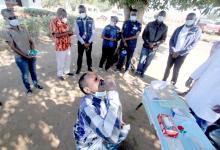WHO Supports the cholera vaccination campaign in Zambia’s hot spot districts as the country accelerates its efforts to eliminate the deadly disease
Although Cholera is a preventable disease, it remains a significant public health problem globally. Each year, there are 1.3 to 4.0 million cases of cholera, and 21 000 to 143 000 deaths worldwide. Zambia has experienced cholera outbreaks since 1977 and the country’s last major outbreak lasted from October 2017 to June 2018 with a total of 5,935 reported cases and 114 deaths. The risk factors mainly include inadequate access to clean and safe water, poor sanitation facilities, poor solid waste management and consumption of contaminated food.
In 2019 the Zambian government committed itself to an ambitious target of eliminating cholera by the year 2025 ahead of the Global Taskforce on Cholera Control’s 2017 global strategy which aims to reduce cholera deaths by 90% and to eliminate cholera in as many as 20 countries by 2030. This agenda is supported at the highest level of leadership with unprecedented political will in implementation of the country’s Multisectoral Cholera Elimination Plan. The multisectoral plan lays emphasis on ensuring adequate safe water and sanitation coverage in the cholera hotspots including conducting oral cholera vaccination campaigns. Cholera “hotspots” are specific and relatively small areas where the cholera burden is most concentrated and they play a central role in the spread of the disease to other regions or areas. Approximately 3.5 million people live in cholera hotspots in Zambia. Targeting cholera hotspots as a priority has helped focus cholera control programmes on the most vulnerable populations.
Since January 2021, the Ministry of Health has worked in collaboration with other line ministries with support from the World Health Organization and other partners to conduct cholera vaccination in Chiengi, Kabwe, Kapiri-Mposhi, Kitwe, Lusaka, Mazabuka, Monze, Mpulungu, Nchelenge, Ndola, Nsama, Shibuyunji and Sinazongwe districts. These hotspots were selected based on geographical and contextual factors such as the recurrence of outbreaks within the last 10 years, poor WASH services, existence of transit points, presence of slums, areas prone to flooding, fishing camps, and influx of refugees.
The launch of the first round of the cholera vaccination in the rural district of Ngabwe on 4 June 2021 put a spotlight on the OCV campaign in the country. It also highlighted the importance of the use of Oral Cholera Vaccines in conjunction with improvements in water and sanitation to control cholera outbreaks and for prevention in areas known to be high risk for cholera. The Zambia National Public Health Institute director, Professor Victor Mukonka, was present in Ngabwe district to launch the campaign which was targeting the population of approximately 21,000 people. Professor Mukonka stated that the Ministry of Health was moving away from curative to preventive interventions and that the implementation of the OCV campaign was important in preventing cholera. He urged the district to focus on engaging community leadership who were critical agents in mobilizing communities to appreciate and accept the vaccine.
The World Health Organisation has supported the country in conducting the situation analysis, mapping of the hotspots and has worked with the Global Alliance for Vaccines and Immunizations (GAVI) and the Global Task Force on Cholera Control (GTFCC) to ensure that the country receives the life-saving vaccines. It has also advocated for a multisectoral approach in implementation of high impact interventions particularly improving access to water and sanitation facilities. The WHO Representative, Dr. Nathan Bakyaita was also present in Ngabwe district and stated that WHO remained committed to working with other UN agencies to support the implementation of the country’s multi-sectoral plan on the elimination of cholera.
The OCV campaign has been conducted despite the on-going COVID-19 pandemic. The government has committed itself to continuing the provision of other essential health services in order to safeguard the gains made in health and to promote the health of the population. A phased approach for the 11 identified hot spots across the country has been used. Since January 2021 a total of 5 hot spot districts have been covered with the two rounds of the OCV while one district has conducted the first round. There is a strong commitment to ensure 85% of the Zambian population living in the hotspots are vaccinated with the cholera vaccine.
